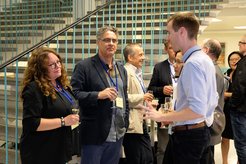Towards a Better Understanding of Postcolonial Societies
Interview with Jacqueline Knörr about her new book
On Wednesday at the 2018 EASA conference Jacqueline Knörr presented her new book, Creolization and Pidginization in Contexts of Postcolonial Diversity, which she co-edited with Wilson Trajano Filho. The volume was published this past February by Brill as part of the series Brill’s Studies in Language, Cognition and Culture.

We talked with Jacqueline Knörr prior to her presentation and asked her some questions about the book:
What is the topic of your new book?
We examine phenomena that arise out of and are transmitted within contexts of extensive social diversity – new shared languages, sociocultural practices, and political identities. We focus particularly on postcolonial societies and decolonization processes as well as the interactions that have been shaped in manifold ways by the experience of colonialism and the efforts to overcome it. A common theme is social and political processes of inclusion and exclusion, which are related to distinctions and similarities concerning, amongst others, ethnic background, religion, and social class.
Why do you find this topic particularly intriguing?
Oh, where do I start? For one thing, there are personal reasons, i.e. my own experiences with diversity and postcolonial conditions. Then there is the scholarly interest in the topic and the desire to contribute to an improved understanding of a world that is shaped by increasing diversity and mobility. There are many misconceptions and prejudices here in Germany, too, and unfortunately we also observe an increasing tendency towards the exclusion of those experienced as different. Incidents of hostility and violence towards asylum seekers and migrants – but also towards foreign students and scholars – are on the rise.
And what is the reason for this increase in hostility?
The contributions to this volume show that it is not differences per se that are a source of conflict, but rather the associated – often false and unsubstantiated – ideas and assessments concerning the foreign or unfamiliar.
How long have you been working on this topic?
In a sense I have always been interested in the way that differences and commonalities are linked. For differences do not have to be something divisive – they can also be experienced as complementary. This is true both for individuals and for groups. One thing that I look at in my research is the experiences of children and young adults in migration-related contexts.
What can be learned from working with young people specifically?
Observing young people makes it very clear that the association of “other” with “threatening” is something that is learned, not a given. Someone who grows up in an environment in which diversity is a normal part of one’s personal and socially accepted reality typically does not grow up to become a racist – nor, as it happens, a rootless person without a sense of home.
How did the book come about?
The book is based in part on the individual research conducted by Wilson Trajano Filho and by myself; the remaining contributions derive from papers given at a conference at the Max Planck Institute for Social Anthropology in Halle.
What new insights does the book offer?
I hope that it helps increase recognition of the fact that the concepts and models that were developed in the context of Western social science research are not by themselves sufficient to understand societies that have been shaped by completely different historical conditions.
What do you see as possible ways to better understand these societies?
We need new and innovative approaches. The concepts of creolization and pidginization are a step in this direction. They are the provisional result of the confrontation with the particular features of postcolonial societies on the one hand, and the attempt to study these societies by employing approaches developed within different disciplines on the other. The hope is that they can contribute to a better, more in-depth understanding of the social, cultural, and political developments in postcolonial societies and contexts.
What are you working on now?
My current research investigates the processes that are relevant in the construction of the nation and the state in postcolonial societies. Amongst others, I look at the role ethnic identifications and transnational interactions play in such processes. Here, too, I draw on and refine innovative theoretical and conceptual approaches that allow me to account for and examine in comparative perspective the particular historical, social, cultural, and political features of postcolonial societies.
For whom is the book likely to be of interest – who should read it?
It is worth reading for anyone who is interested in the connections between language, culture, and identity in postcolonial contexts and in innovative, transdisciplinary approaches to studying them.
----------------------------------------
Book details:
Jacqueline Knörr, Wilson Trajano Filho (eds.), Creolization and pidginization in contexts of postcolonial diversity; Brill's Studies in Language, Cognition and Culture, 432 pages Hardcover, Brill 2018
